Climate Change: A View from the Field
(by Dan Harvey Pedrick)
Each creature must, if on survival bent, adapt itself to its environment. --Anon.
That poetic and catchy little homily first caught me from the title page of my grade seven science book. That was a long time ago and it has stuck with me like a piece of Velcro® ever since, which I suppose was the author's intention. But now it is more than just sticking with me, it's haunting me, especially after the experiences of last winter.
Like many disasters this one seemed to strike without warning. But there were warnings, lots of them, beginning with the catchy little phrase quoted above, but I guess I wasn't really paying attention. The first hints of what was about to happen appeared in November. I didn't think too much of it at the time. Here on Vancouver Island we don't really expect great things from November in the way of pleasant weather so, when it started to pour freezing rain I just shrugged it off. But then something strange happened: it didn't stop. It didn't even let up. Soon the usual biblical allusions to Noah and the ark began to pepper the daily conversation of the citizenry, umbrella and raincoat sales boomed, roofing contractors unplugged their telephones, and people starting dreaming about the tropical sun and how lovely it would feel in December, January, and February. And normally I would be doing the same but this year I had decided to stay home and try to start a new pony in the all-weather arena that had been built at our club grounds--a big mistake as it turned out.
For a while the drainage system on our field kept up with the torrential rains leaving only the occasional puddle of water on the surface. But finally one dark and stormy night (after so many others) a nearby creek overflowed its banks and floodwaters began to pour over the dikes around the polo field. In a matter of hours the field had become a lake. A deep lake, with fish in it. The rain stopped, briefly, and the sun came out--but the lake remained. The drainage system and its little electric pump were completely overwhelmed by more water than they were ever meant to deal with. Ducks floated upon it, and geese, and seagulls--even stately Trumpeter swans. It seemed like there was nothing else to do but forget about polo for awhile--and go boating.
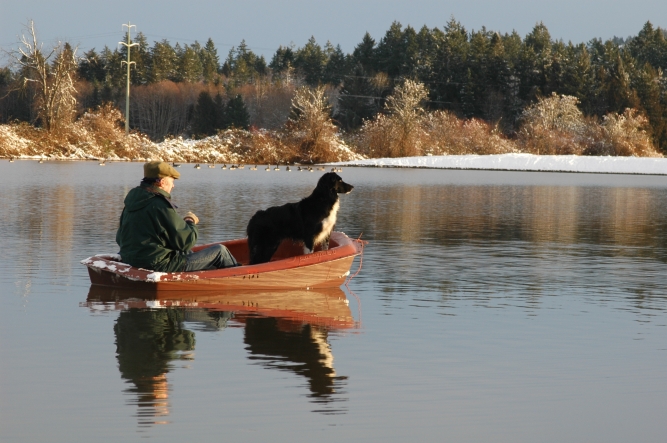
A lake has a profound effect on our aesthetic sensibilities. Shimmering and glistening in the winter sun this new one was too beautiful, in a tragic sort of way. Soon people were offering names for it: Lake Polo, Chukka Pond, Bridle Mere. But the weather gods were by no means done with this project yet. Suddenly the temperature plunged like a stone. A fresh snow covered the land overnight and the lake became a sparkling diamond of exquisite beauty set in frosty filigree. Then the weather turned even colder. You could still fish if you wanted to chop a hole in the ice but the boating season was over.
When liquid water turns solid in Canada (even in this coastal zone of supposedly mild climes and mellow inhabitants) Canadians respond in a strange but predictable way, becoming suffused with dark passions and violent desires. Conditions had now reached a stage of perfection for the bizarre natural phenomenon about to unfold. Suddenly battalions of previously unseen humanoids materialized on our polo grounds like an old testament plague. They rolled in aboard huge gas-guzzling SUVs and pickup trucks loaded down with sticks, skates, net goals, and all manner of refreshment. They swarmed across the ice occupying all strategic positions on Lake Polo. They asked no permission for this invasion. They ignored our entreaties to exercise restraint. They swore, they spit, they littered, they fought, they laughed at the suffering of others. In other words, they played hockey.
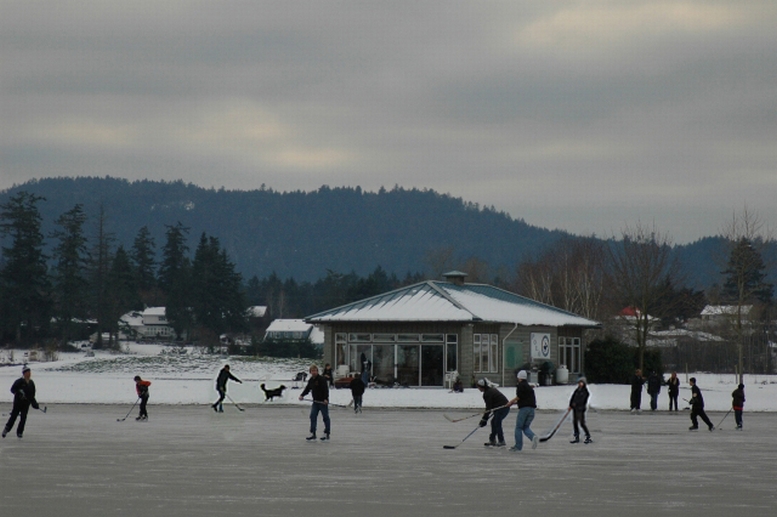
As I pondered the situation on the ground I thought, if only we could recruit these people into our club, civilize them, teach them our sacred ways. Yes, they are savage, but strong and fit. They could make good polo players with enough training. But just then a hockey puck whizzed past my ear and I withdrew in tactical retreat.
That night I brooded in front of the fire. I realized there was no hope for these newcomers as far as converting them to polo was concerned. They were happy in their barbarous ways, strange as it may seem. So, I made up my mind to extend my tactical retreat into a full-blown migration. I would go to Mexico where the sun ever shines and polo is played by the conquistador class every morning before breakfast. But before setting out on this pleasant journey I would try a daring reconnaissance mission, in disguise of course, and risk getting close enough to see the whites of the eyes of these untamed interlopers who had taken over our hallowed field. I dressed myself in such a way as to blend in among them and prayed they would not recognize me for what I really was.
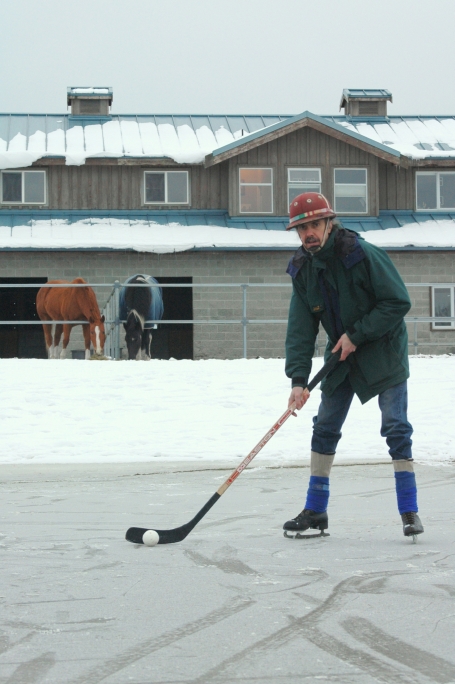
I skated out onto the ice and tried to act nonchalant. I started working the ball (I mean puck--but actually it was a ball, a polo ball, and I realize now this was a fatal mistake). Dodging the odd moaning body that lay sprawled on the ice, I glanced up briefly. Some ignored me, some glared, and others just smiled wickedly. Finally one of them nodded for me to take my position on a team, which I did, likewise without a word. At a signal we scrambled for the puck. Suddenly I had it! Tearing away I turned to look for a teammate open for a pass. A split second later I was hit from behind by what felt like a runaway metro train. I slammed into the ice and felt a skate blade run over my thigh. Someone swore at me. I tried to get up but a jab in the ribs with a hockey stick forced me back down. That's it, I thought, they were taking me prisoner--if I was lucky!
"Dan! Dan! Wake up," we have a plane to catch!" It was my dear wife, I was in bed, and my first hockey game in more years than I care to remember was just a fading nightmare. We were off to Mexico where, as I said, the sun ever shines--or so I thought.
Looking out of the aircraft window as we crossed the U.S. of A. I took smug pleasure in the sight of endless square miles of frozen, snow-covered ground passing rapidly by underneath us. That is, until I realized we were over Mexico already where it should have been a little more spring-like to my way of thinking. Soon our stewardess served us a hearty onboard lunch consisting of two bags of chips (one for each of us) and we were ready to make our final approach to Mexico City.
We flew low over Plaza Mexico, the largest bullring on the planet, where we would join our friends the Solórzanos in just a couple of hours. The Solórzanos are the equivalent of a royal family when it comes to the bulls in Mexico. The late Jesus "Chucho" Solórzano achieved legendary fame as a matador in the middle of the last century and was a polo-playing compañero of the Gracida family. His four sons followed him into the bullring and daughter Veronica might have done too if tradition allowed it. His beautiful and ageless widow Carmen still reigns over the clan. And now young Salvador (younger than me, anyway) was enjoying an unprecedented success as an impresario with his latest protégé, el Pana, who, although no spring chicken himself, had suddenly pole-vaulted to huge success as the comeback kid of the season, showing the youngsters how to wallop those fighting bulls with a style born of years of trying and getting nowhere.
"Bring your polo stuff," Sal had told me, "we will play in Tecamac on Wednesday and in Querétaro on Saturday." I couldn't wait, even if I had to sit through a hundred bullfights before the first throw-in. Bring 'em on, I thought, so long as that old sun is shining.
By the time we drew near to Sal's place it had become increasingly clear that something was dreadfully wrong in Mexico. The sky was the color of lead and growing darker. Large clouds of vapor hung around our faces and condensed on our noses which dripped steadily. People around us were hacking and coughing. It was cold. Very cold. Then it started to rain. We darted into the Nikko Hotel, the swank digs Japan Air Lines keeps for its friends and clients in the Polanco district. The desk clerk gave us an umbrella which would serve us well for the rest of our time in this erstwhile tropical paradise. We dried ourselves off, freshened up a bit, and made ready to dash across the street to the Solórzano penthouse where we had been ordered to rendezvous before heading to the bullring.
We were welcomed with more warmth than you might expect from a family who spends their winter weekend afternoons watching large animals put to death but, hey, it's an art not a sport, as they keep telling me. And they're right, I now believe. I mean, consider the beef industry (you've eaten beef, haven't you?). Countless cattle are slaughtered for meat every day with very little reflection or ceremony. The fiesta brava, corrida de toros, bullfight, or whatever you want to call it, is the artistic component of that industry. The bull is marked for death, to be sure, but he is admired, respected, and revered in the process. He also gets a halfway decent chance at revenge while his owner gets many times the price of a slaughter steer. I still end up feeling very sorry for the bull, though, but that's alright. You're supposed to.
So tell me, when's the last time you had a good cry over your Big Mac?
Anyway, we were surprised to learn that the corrida would go ahead even in the rain as nearly all seventy-thousand seats in Plaza Mexico were sold out. The bulls would have more than an even chance today, I thought. We introduced ourselves to the suddenly-famous el Pana who was sitting quietly in a drawing room. He was very polite and spoke to us in French (because we said we were from Canada, I guess). There was a great air of meditative calm about him and we quietly withdrew so not to disturb it. Suddenly it was time. Everyone began to file down to the porte cochère where a small convoy of automobiles waited in the rain. We had unwisely left our winter clothes behind but Carmen provided us with wraps to keep us warm and dry for this long afternoon of death (and freezing our butts off anyway).
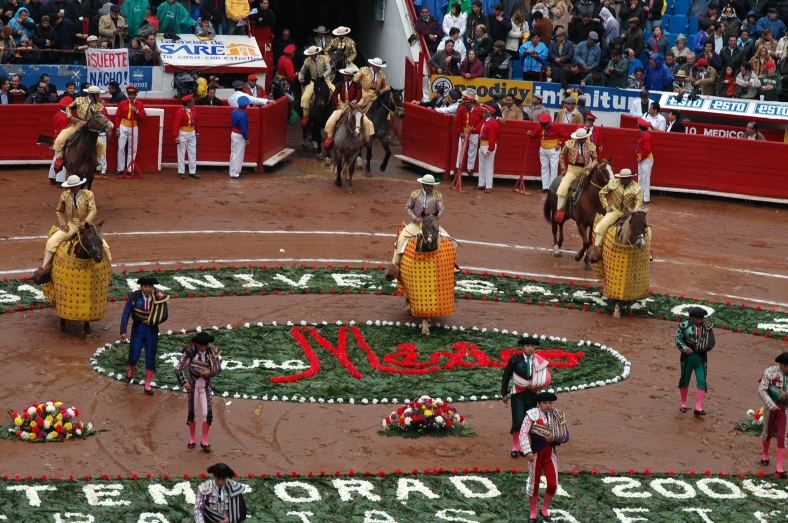
As we approached the bullring the milling crowd became a rain-soaked throng. Hawkers sold plastic ponchos for a dollar. Scalpers shouted, trying to sell the last few tickets. Plainclothes cops frisked us at the gate. But the sound of many voices chanting in unison rose above all others: "A-se-sino! A-se-sino!" Murder! The demonstrators were young, intense, and disciplined. What would Hemingway think of this, I wondered.
The eight-bull holiday spectacular was forty-five minutes late in starting. The intensity of the rain increased and I realized that it was going to be a long night. I realized too that there would be no polo on this trip because the earth was just too wet. All this way to escape winter but we had only succeeded in bringing it with us! This (to return to the title of this opus) is because the climate is changing, as it always has, at varying rates, since the world began, but even faster now, and we have no choice but to accept it and adapt to it if we can--if it is not too late. Meanwhile life goes on. Rain falls, fields flood, warm places turn cold, bulls rampage, die, and are forgotten.
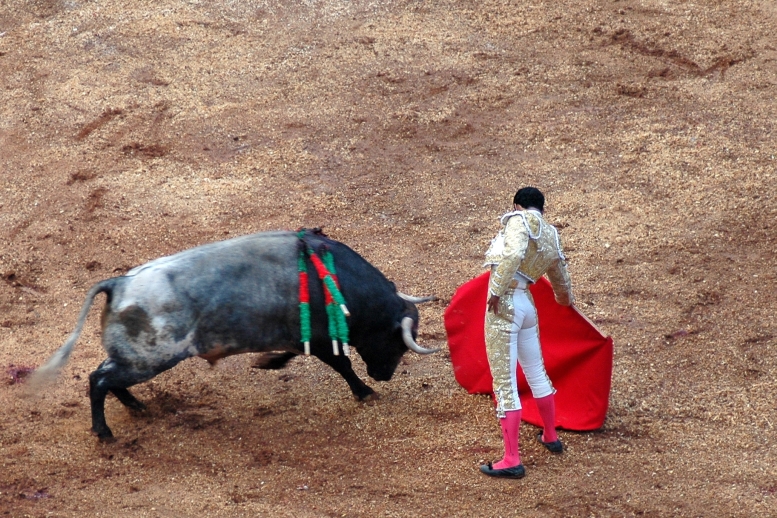
Eventually the rain stops and the Lion of the Season is carried out of the arena on the shoulders of his adoring fans, the crowd eventually dissolving in the streets of the city as their hero discreetly slips into a car and drives away. The demonstrators are gone but they'll be back next time, and the time after that, for as long as it takes. I am somehow glad they were there even if they cast an overwhelming shadow of remorse over me. But I grieve not only for the bulls that must die but because they must soon die out. The time is coming when there will be no place for fighting bulls in Mexico or anywhere else and the world will forever lose something ancient, beautiful, and sad. But this may well be the least of our problems. And as players of an outdoor game we poloists must be among the first to feel the brunt of this wave of increased radiation and intense battery from the skies. Here come fire and brimstone, my friends, and no high-tech helmets and eyewear can offer much protection from it.
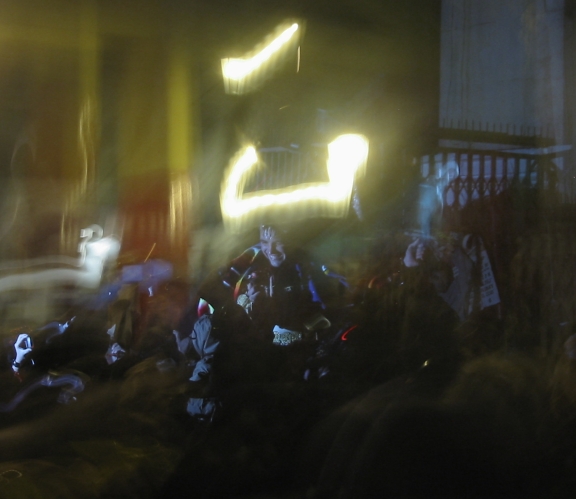
Well, that's it. No polo this trip, but it's hard to be disappointed with the experience. We visited the ruins of the great city of Teotihuacan, a huge metropolis that its builders dedicated to the gods of nature in the hope that it would last forever. We marveled at the stunning murals of Diego Rivera, who was inspired by a revolutionary social philosophy that he believed could save the world. In the Alameda park we chatted with mounted city cops dressed as charros, those super-caballeros who represent the gallantry of the Mexican character. Most of all we reunited with old polo friends whose faces have changed and in their eyes we saw reflected the changes in our own. Maybe that's all we really came here for anyway. That and for some fresh perspective on the fact that stuff happens, change is eternal, and all things must pass.
The great thing about polo is it's so much more than polo.
(This article was published in Polo Players' Edition magazine in May 2007.
Back to Victoria Polo Club Home Page
